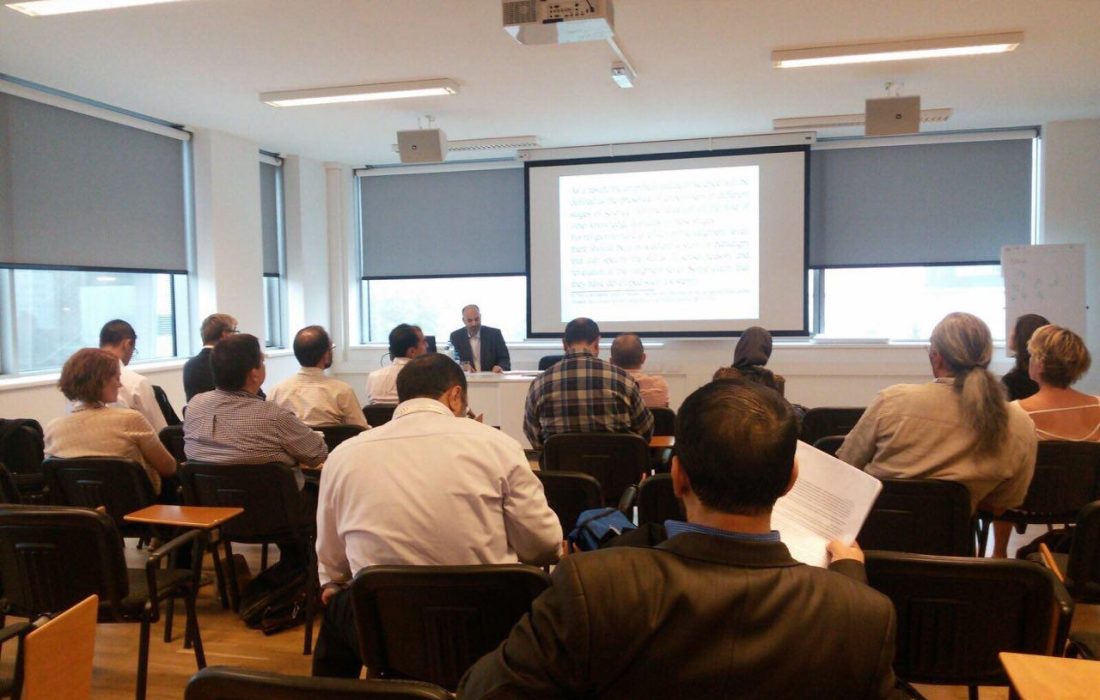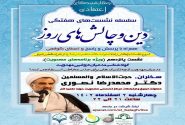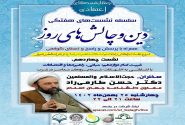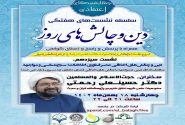به گزارش روابط عمومی انجمن، حجت الاسلام و المسلمین دکتر رضا برنجکار به همراه تعدادی از اساتید دانشگاه تهران برای شرکت در کنفرانس علم و دین در دانشگاه وین، عازم اتریش شد.
وی در تاریخ ششم شهریور با موضوع “تاثیرات محتمل دین بر علم” به ایراد سخنرانی پرداخت.
متن سخنرانی ایشان که به زبان انگلیسی ارائه شد به شرح ذیل می باشد.

In the Name Allah the Compassionate the Merciful
The Possible Effects of Religion on Science
Introduction
Religion and science are the two precious assets of the human being in his way toward a blissful life replete with welfare, serenity, and spirituality. Whitehead says, “Religion and science are the most influential forces that affect the human, and the forthcoming direction of history depends on the type of the relationship between these two phenomena”[۱].
Interaction and cooperation of religion and science will lead to their synergy and so, will help the human attain the prosperous life, provided that their capacities and the way they can help each other are properly identified.
The present article does not address the effects of science on understanding the religion, but rather, it presents the possible effects of religious knowledge on science.
Some thinkers believe that religion and science have two distinct realms and so, reject any kind of affecting and being affected relationship between the two. On the other hand, those who consider a common realm for religion and science and believe in their interaction have talked about the different effects of religion on science. The difference between these two perspectives lies in the principles used by the two groups of thinkers in interpreting the religion and science. For example, those who reduce the realm of religion to a personal domain and consider it as a spiritual relationship between God and human cannot conceive a common realm for religion and science or think about their interaction. Therefore, before embarking on any discussion, we should clarify on our assumptions about religion and science.
Assumptions and principles of the discussion
Each of the following assumptions might be disputed by scientists or theologians and are in need of an independent and comprehensive discussion, but they are presented here as initial assumptions so as to set the grounds for the main discussion.
- Religious and scientific statements both are factual and related to the reality and have the ability to discover it. Therefore, those viewpoints that consider the religious language as non-cognitive[۲] or believe in instrumentalism are unacceptable. Nonetheless, in addition to their being factual, religion and science can have other functions such as ethical and instrumental roles.
- Based on the first assumption and the point that religion and science both embark upon interpreting the same world, they have the same realm and have talked about the same topics.
- Due to the first and second assumptions, religion and science can conflict or interact with each other.
- Religion addresses human’s worldly and otherworldly lives. As this world is the preface for the Hereafter, religion has attended all aspects of the worldly life such as doctrinal, ethical, cultural, and economic dimensions.
- Religion has addressed the personal life of the human and his relationship with God as well as his social life and his communication with other humans, other living creature, and the environment.
- The criterion for consideration of a proposition or theory as scientific is the role of experiment in producing it, not the rejection of the role of other factors. Moreover, contrary to the stance of the positivists, it is not necessary to take the scientificity of a theory as its verification by experiment, though this is not possible due to the problem of induction.
- Based on the previous assumption, religion can have a role in the production of a scientific theory. Nonetheless, the quality of this role should be illuminated. This is the aim of this article.
The possible effects of religion on science
In presentation of the effects of religion on science, we first start with the less important effects and move on to the more important ones.
- Religion can help science to attain its goals. For example, through creation or enhancement of the faith, love, and hope in the heart of a patient, religion expedites his/her treatment by physicians. This effect is the weakest one, and is an effect on the application of science, not on its production.
- Religion can suggest topics to be researched by science. Examination of these topics can lead to formation of new theories and development of science. Some sociologists have used this effect to explain the Islamic sociology[۳].
- Through goal setting, religion can direct the science into certain ways or prevent it from entering some others. For instance, religion considers the main goals of life as attainment of the spiritual and ethical perfection through worshipping God and being affectionate to other humans. If rulers and scientists accepted this goal, knowledge would not move to the weaponries and instead, would develop in paths congruent with religion.
- Religion can have an effect on interpreting some experiments. Duhem, one of the main critics of using induction in science, believes that experiment in physics is not merely observing a phenomenon, but more than that, it also includes its theoretical interpretation. This statement of Duhem has been accepted by most philosophers, who note that observation in physics is theory-laden[۴]. Of course, this proposal is not limited to physics and exists in all sciences. Therefore, an experiment does not have always the same interpretation. For example, an individual’s behavior which is contrary to the common norms can be interpreted as an abnormality and a psychological disorder, or it can be construed as a sublime act by a human who adheres to values higher than the common ones. Another example is that some contemporary physicists have presented two religious and nonreligious interpretations of the anthropic principle[۵].
- Religion can suggest some theories to the scientist at the knowledge collection level which can then be examined through experiment at the judgment level. As one of the main critics of induction in science, Popper believes that science has two levels: collection and judgment. At the collection level, any knowledge domain, including religion, can be used to make conjectures about a theory. But all theories should be examined by sensory experience at the judgment level. If it is not refuted by the experiment, it can then be considered a scientific theory[۶].
- Religion can provide science with some fundamental statements on basis of which science can theorize. For example, based on the prohibition of usury and the point that labor and capital should share both profit and loss, the knowledge-based businesses can be the foundation of economic activities. Or based on the practical orders of religion, it is possible to pass civil and criminal rules and regulations, as it is possible to pass such rules according to the convention or rules of the ancient Rome.
- In addition to the sensory experience, religion can have a role in judging the knowledge. This is a methodological effect and addresses the most important and the ultimate part of science, which is judgment[۷]. This is contrary to the previous effects which either were not methodological or were brought forth in the initial stages of the scientific methodology. If we abandon the exclusive role of the sense in judgment, then revelation and reason can also be used to judge the knowledge. In other words, according to the ۷th effect, the scientific experiment should be taken in a broader sense to include intellectual and divine experiences as well. As a result, the empirical nature of science will be defined as the presence of experiment in different stages of science, not the rejection of the role of other knowledge domains in these stages.
For religion to have an effect on the judgment level, there should be a procedural system or paradigm that can specify the status of sense, reason, and revelation at the judgment level. Some claim that they have developed such a system[۸]. This effect does not hurt the role of science in reflecting the reality, because one of the assumptions of this article was that revelation and religion also reflect the reality. Since they are factual and related to reality.
Conclusions
Confirmation of the possibility of the first six effects or even their occurrence in the history of science is not difficult. The brief explanations provided for each effect can be used to prove this. However, the seventh effect is in need of more discussion and has implications that most of the philosophers of science find difficult to accept.
[۱] See: Barbour, Ian, Science and religion, translated by Baha al-Din Khorramshahi, p. ۱۳
[۲] See: Hick, John, Philosophy of religion, translated by Bahram Rad, pp. ۱۸۲-۲۰۰
[۳] See: Amzian, Mohammad Mohammad, Research methods in social sciences from positivism to normativism, translated by ‘Abdulqader Savari, pp. ۲۱۹-۲۲۰.
[۴] See: Gillies, Donald, Philosophy of science in the twentieth century: Four central themes, translated by Hasan Miandari, p. ۱۶۲.
[۵] See: Golshani, Mahdi, From secular science to religious science, cited in Hasani, Seyyed Mohammad Reza, et al, religious science, p. ۸۳.
[۶] Popper, Karl Raimund, Conjectures and refutations, translated by Ahmad Aram, pp. ۴۱-۸۱ (chapter one: conjectures and refutations).
[۷] Bostan, Hossein, et al, A step toward religious science, vol.۱, p. ۱۲۷.
[۸] That is, the Islamic Sciences Academy that has been established by the late Seyyed Monir al-Din Hosseini. See: Hasani, Seyyed Hamid Reza, et al, Religious science, pp. ۱۳۳-۱۶۳













